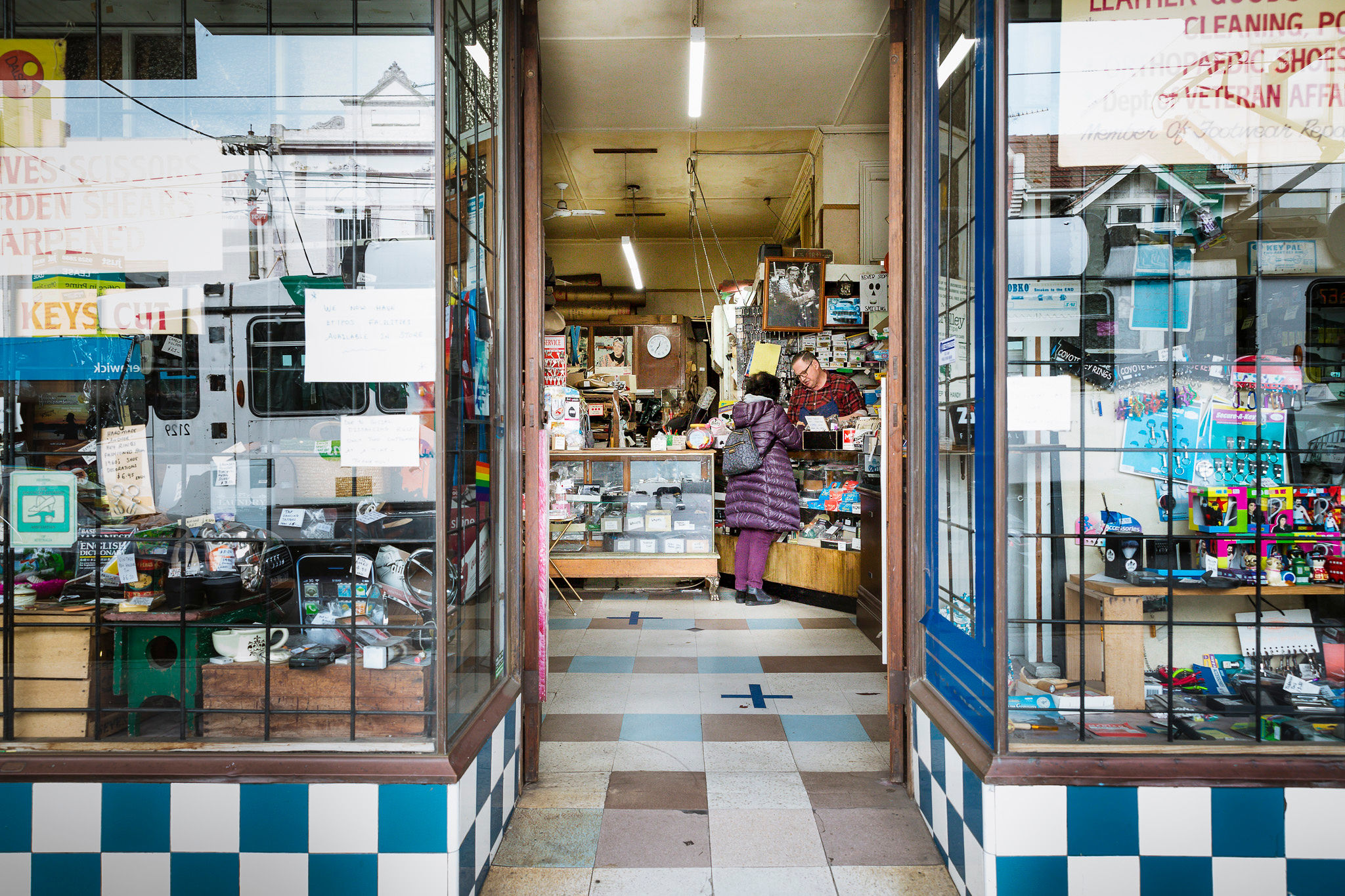Take a peek behind the scenes of some of Glen Eira’s long-running businesses. Get to know the owners and their stories and learn how Glen Eira’s streetscapes have changed over time in our digital exhibition Talking Shops: Glen Eira Stories.
Blight’s Shoe Repairs & Discount Tobacconist
est. 1932
Address: 405 Glenhuntly Road, Elsternwick
From an interview with Jane Blight-Wilcox and Wes Wilcox in 2021 by by Aron Lewin and Tatiana CC Scott from Tales of Brick and Mortar. Interview edited by Aron Lewin. All Photographs © Tatiana CC Scott. Developed for Glen Eira City Council for the Talking Shops project.
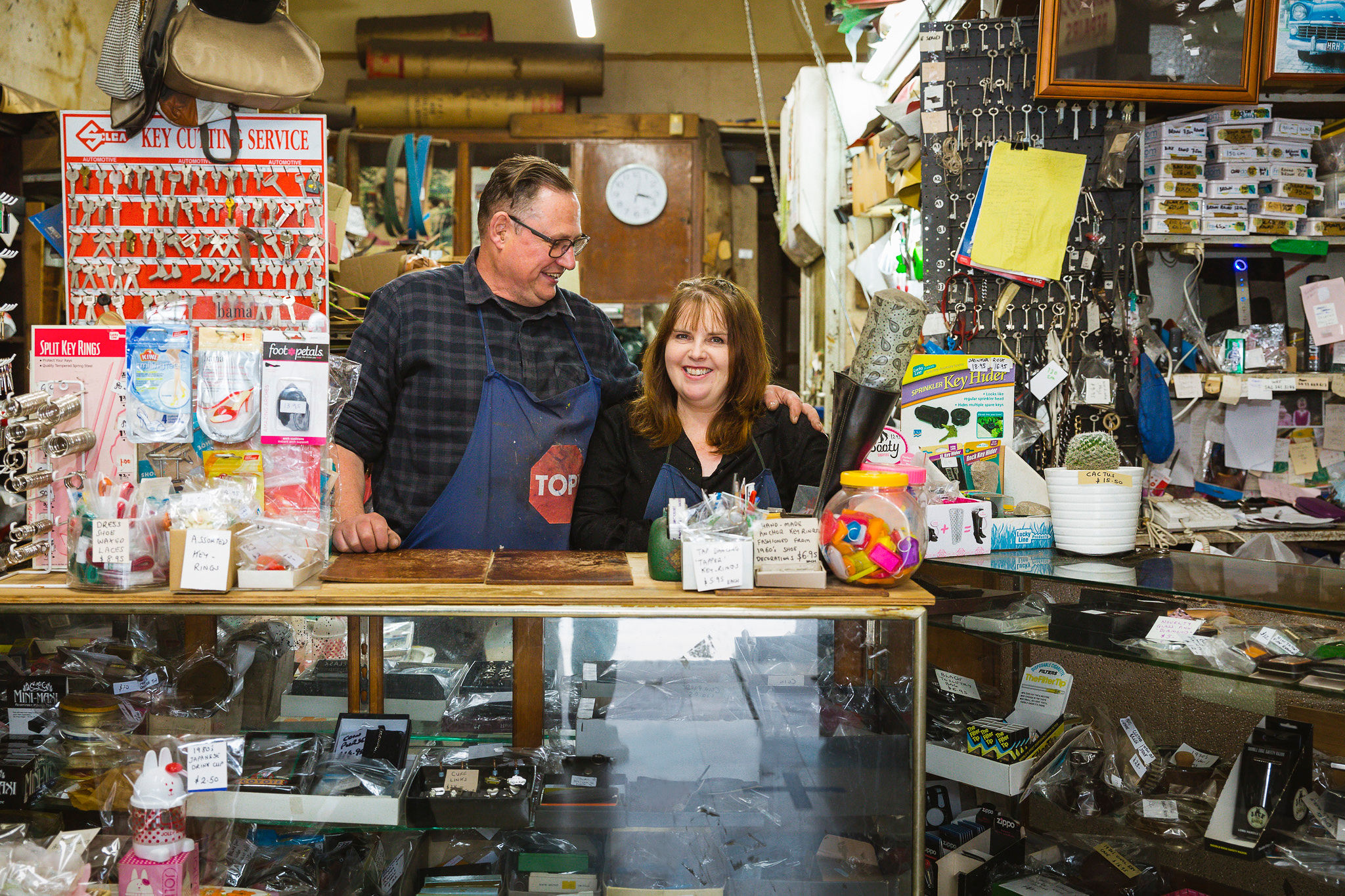
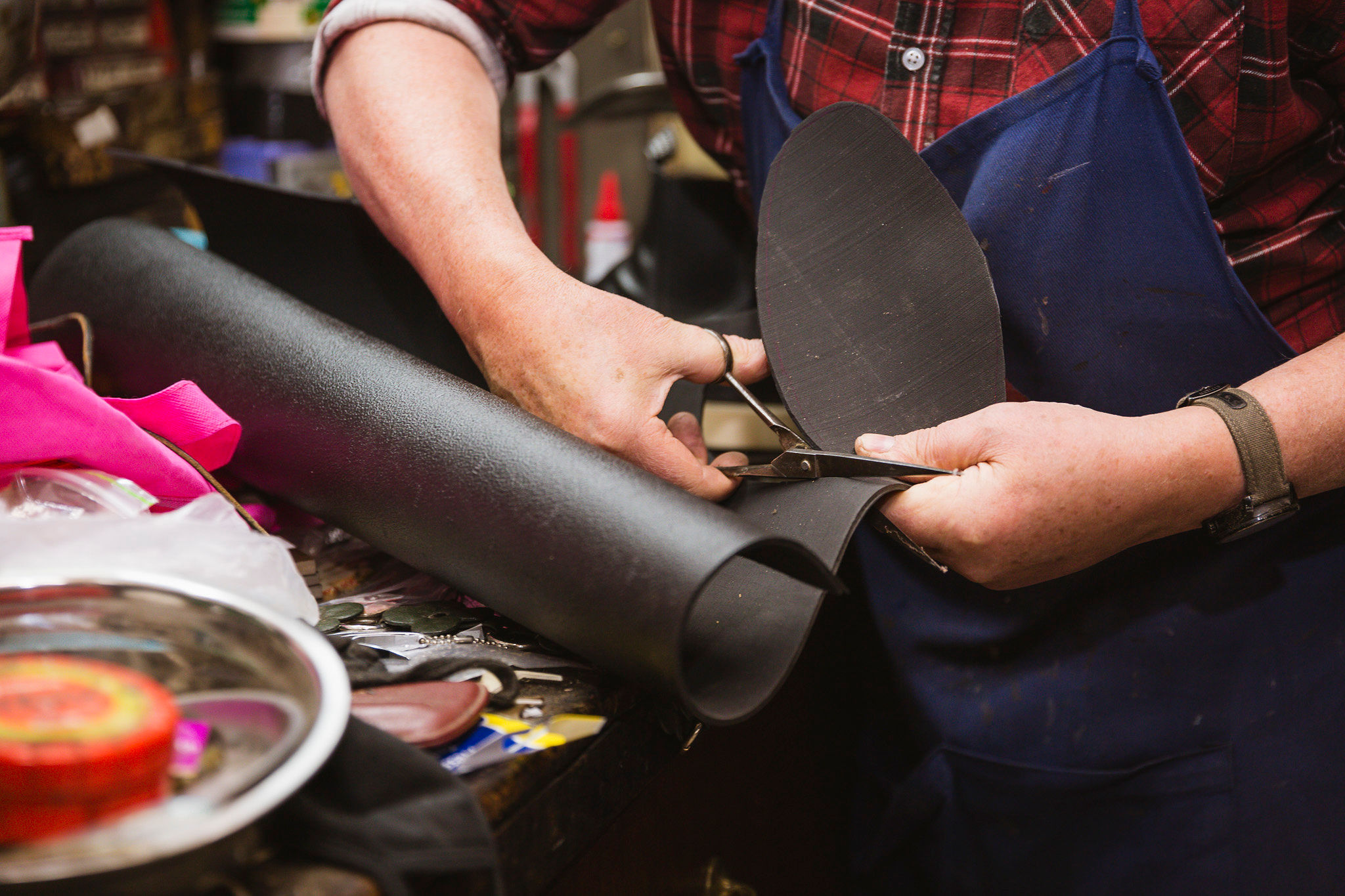
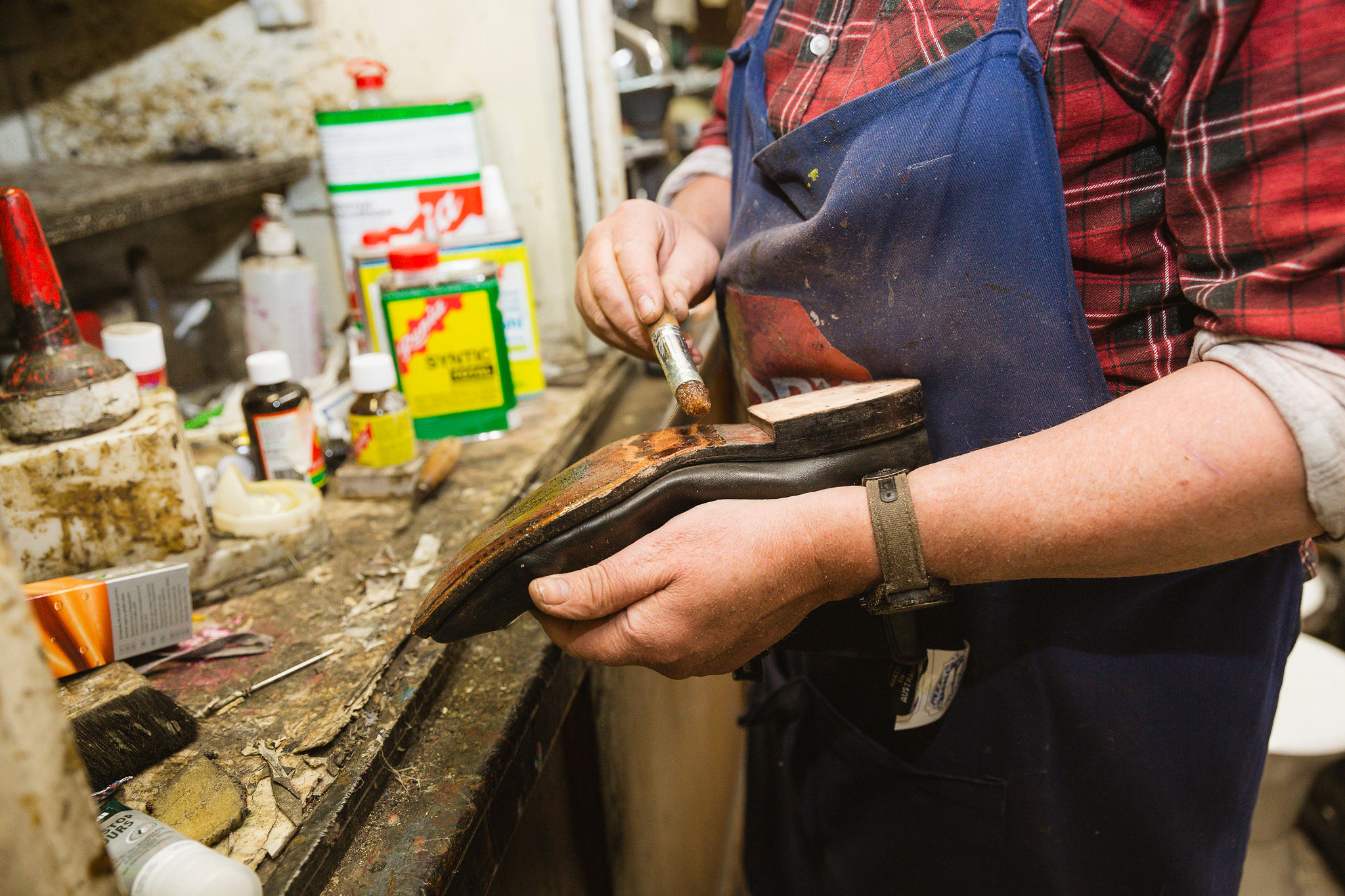
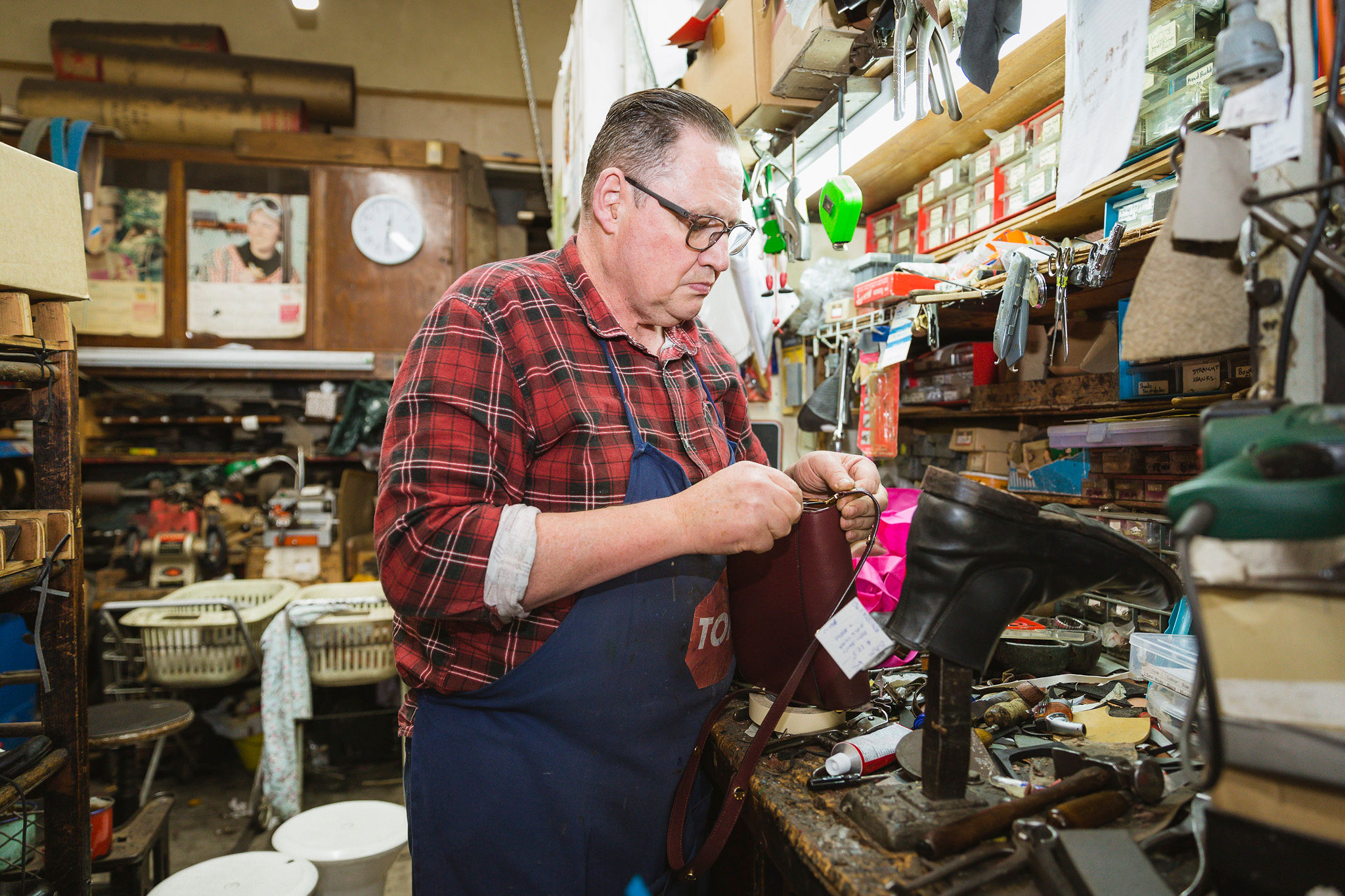
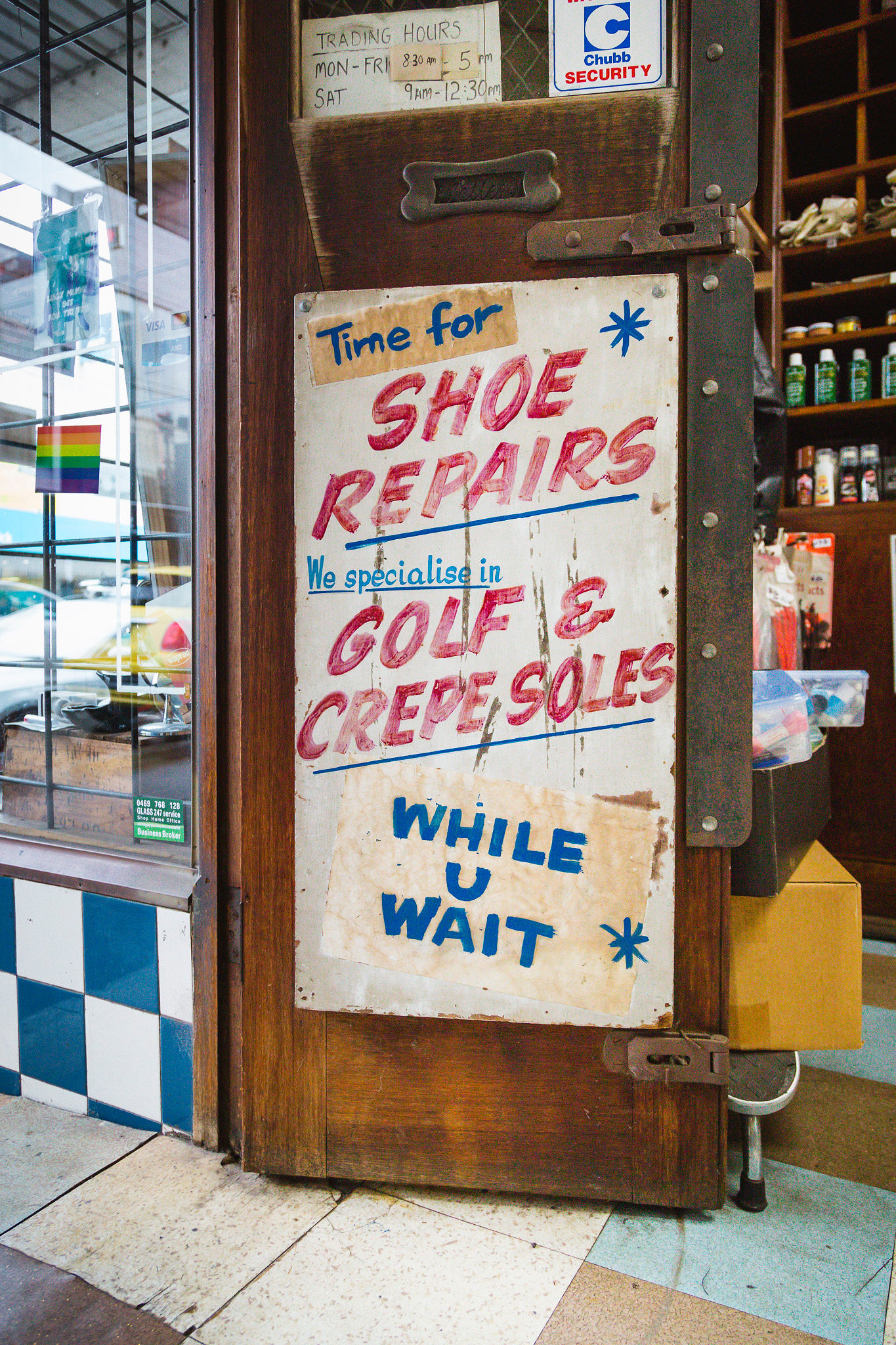
Jane Blight-Wilcox speaking unless otherwise stated.
Blights Shoe Repairs and Tobacconists has been in my family since 1932.
My grandfather, Samuel Newton Blight, started the shop and set it up as a shoe repair and tobacconist. At that time the business had a barber, and there was a tailor, Mr Fletcher, who worked upstairs. Different members of the family – including my grandmother – worked in the shop, and my dad and his siblings ran different sections of the business as they grew older.
Because the business was set up during the Depression years, they had to make the most of their floor space, and having different departments under the one roof kept the business afloat. Back then, everyone needed to get their shoes repaired, especially when they didn't have cars. They walked everywhere, or travelled by horse and cart.
Often people would only have one or two pairs of shoes, and family members would share the one pair.
There was a big demand for repairs of all kinds, which they provided.
My grandfather always worked in the shoe trade.
I believe he ran different businesses prior to Blights, and worked in Collingwood, where there were lots of shoe factories. He was also a big smoker – he’d line up one pipe after another, and smoke cigarettes in between – so that was likely one of his interests that he incorporated into the business.
I never met him, but he was an entrepreneur with a hand in all sorts of different activities. He developed a system called Green Hide Soles, which is a leather sole impregnated with paraffin wax, which makes them durable and long-lasting. It picks up any gravel or dirt that’s stuck to the paraffin, and you could wear it in areas where it was wet. In particular, work boots and army boots had this sole stitched onto it.
We also have a machine called a Standard Rapid Stitcher. It's a special sewing machine that stitches leather soles to an existing soled shoe. That would be used to stitch the Green Hide Soles. I didn’t realise he developed this system until one of our customers, Edna, who used to work in the shop years ago, came in and told me about it.
Sometimes, you don’t realise your own history.
In the 1940s and 1950s my grandfather and dad had a contract with the Australian Army and the Defence Force.
In the morning, the army truck would pull up, two hessian bags full of army boots would be dropped off, and my dad and grandpa would collect the boots to be repaired. They’d place the army shoes on the back wall, and the black marks from the paint on the edges of the finished boots would indicate how big the pile was
The fact that they had a contract with the Australian Army was significant, and a really valuable thing to be able to do. Especially during the Second World War, it was important for the soldiers to have shoes that would last the distance.
For a small shop like this, it must’ve been a huge undertaking.
My grandfather passed away in 1952 and my dad, Newton Samuel, took over the business.
When he was 21, my dad contracted polio.
He was at the Fairfield Infectious Disease hospital for a year and, while still recovering and learning to walk again, he started running Blight’s with his sister Isabelle. He used to say, “when you’re alone in bed, you wish you could get up and do something useful and productive.”
Dad ran the shop for 44 years.
As the second generation owner, he felt that pressure and compulsion to keep those family traditions connected to the shop alive.
Just as I do as the third generation.
Dad didn’t change the business much.
In 1954, Mr. Fletcher sold his part of the business to dad for about £6,000, which was an astronomical amount at the time. Dad had to keep everything going, including the Defence Force contract, to manage the payout.
Dad wasn’t a smoker like my grandfather, but he loved making and repairing things, and shoes were his passion. He would come to the shop at about five in the morning, work until six at night, have dinner, then go back to work. He was never away from work.
Because he’d been so unwell in his 20s, he was so grateful to do a day’s work. He’d say, “we might be able to make that or sell that.” He made dog collars and leads, children’s toys and other things, and place it in the shop window. He was an entrepreneur like his dad, and always open to new possibilities.
In 40 years, he never took a holiday. When we were in our late teens, we’d say, “Dad, you need to stop and take a break.” We’d make him close the shop, and he’d be so grumpy because he wasn’t at work.
My mum, Margaret, started working in 1963. She did the bookwork and ran the front of the shop, and she had no choice but to keep working because that’s what dad loved to do.
It was dad’s hobby really.
I was born in 1968.
We lived in Carnegie, but in 1975 or 1976 there was that big oil crisis and everyone was in a panic about whether they could get petrol. Dad said, “That's it, I can't drive all the way from Carnegie to get to work.”
I would have been about seven years old when we moved behind the shop. Even though Blight’s was very busy and overcrowded, suddenly there were beds, cupboards, furniture, a black and white telly and other things in the residence above the shop to make it liveable. In some ways, it was good for Dad as he didn’t have to travel, but it meant he worked even harder.
From the age of eight, I started working behind the counter. I've worked here for 44 years in between school and other jobs elsewhere. When you grow up in a family business, it's just what you do you. Everyone has to help.
You can't stand around if you've got a customer wanting assistance.
In the 1960s and 1970s, the shop functioned as a general variety store.
We continued doing shoe and bag repairs, selling tobacco items and other fancy goods like wallets and key rings. We also started the key cutting service.
It was a jack of all trades store, and I liked working in the shop as a kid. You’d always be meeting people and socialising with kids from the other shops. There was a real community, and you’d catch up with the families who lived above or behind the shops.
When I finished school, I went to Melbourne Uni and started an Arts Degree, then a Bachelor of Education in Environmental Studies at Deakin Uni. Even when I was at Uni I’d come in and work.
When the family is busy, you've got to help.
From an early age, my dad would teach me to sew things.
I'm not a very mechanical sort of person, but I really loved hand stitching.
Even today, I still do the hand stitching on the shoes. Someone might have a boat shoe and the stitching is coming undone, so I'll stitch that up. Or they might have a bag that needs some hand stitching, or the lining needs stitching. I’ve done that from an early age.
And when the shoes are finished on the machine, they have a raw edge which needs to be re-lacquered.
From an early age, my parents would be busy, so I learned on the job.
With the practical side of things, I’m happy to pitch in where I can be useful.
I never had a sense that I would take over the business.
I imagined Mum and Dad would always be running it, particularly because my dad was here for so long. I was studying a Masters in Urban Geography, and that upgraded to a PhD. I was busily doing that, then my dad was diagnosed with cancer in August, 1996.
I said, “look, I’ll come back and help.”
By that stage, my husband Wes had started doing an apprenticeship with my dad. He had also done an orthopaedic shoe making course, so he knew how to repair and build up shoes. Unfortunately, three months later, my dad passed away.
Suddenly, my husband and I were thrust into keeping the shop going. I was lucky that Wes could take over that role and do all the things that I don't do, and I’m happy to spend time with Wes at work. We’ve been together for 33 years and worked full time together for 25 years.
It’s easier to boss your husband around rather than someone else.
(Wes) I first started working at Blight’s after Nissan in Clayton closed down.
Over the years, I’d done different jobs including working in saw mills and quarries before working as a toolmaker. It's amazing how often I’m reminded of something I did 20 years ago, which offers a clue in fixing a particular item. I’ve gleaned bits and pieces that come together and allow you to repair something.
Following Nissan’s closure, Jane suggested that I come in and give her father a hand at the shop. When I spoke to Newton, we'd organised that I’d be there for three months. After about a year, we realised it was working out, so I stayed on.
Newton and I got on really well. The main thing he taught me was to be present with customers. He was a kind and lovely man, and certainly wasn't one to have a scripted greeting or conversation.
Those conversations make the job go much quicker.
We do all sorts of jobs here.
Knife sharpening, secateurs sharpening, key cutting, resoling & re-heeling shoes and a variety of different repairs.
People will come in with random things. For example, they want their saucepan handle fixed, or they might have an ornament where the base is broken off and they're devastated, so Wes will glue it together. We also do bag repairs, lighter repairs, fix zips and do any sort of odd job.
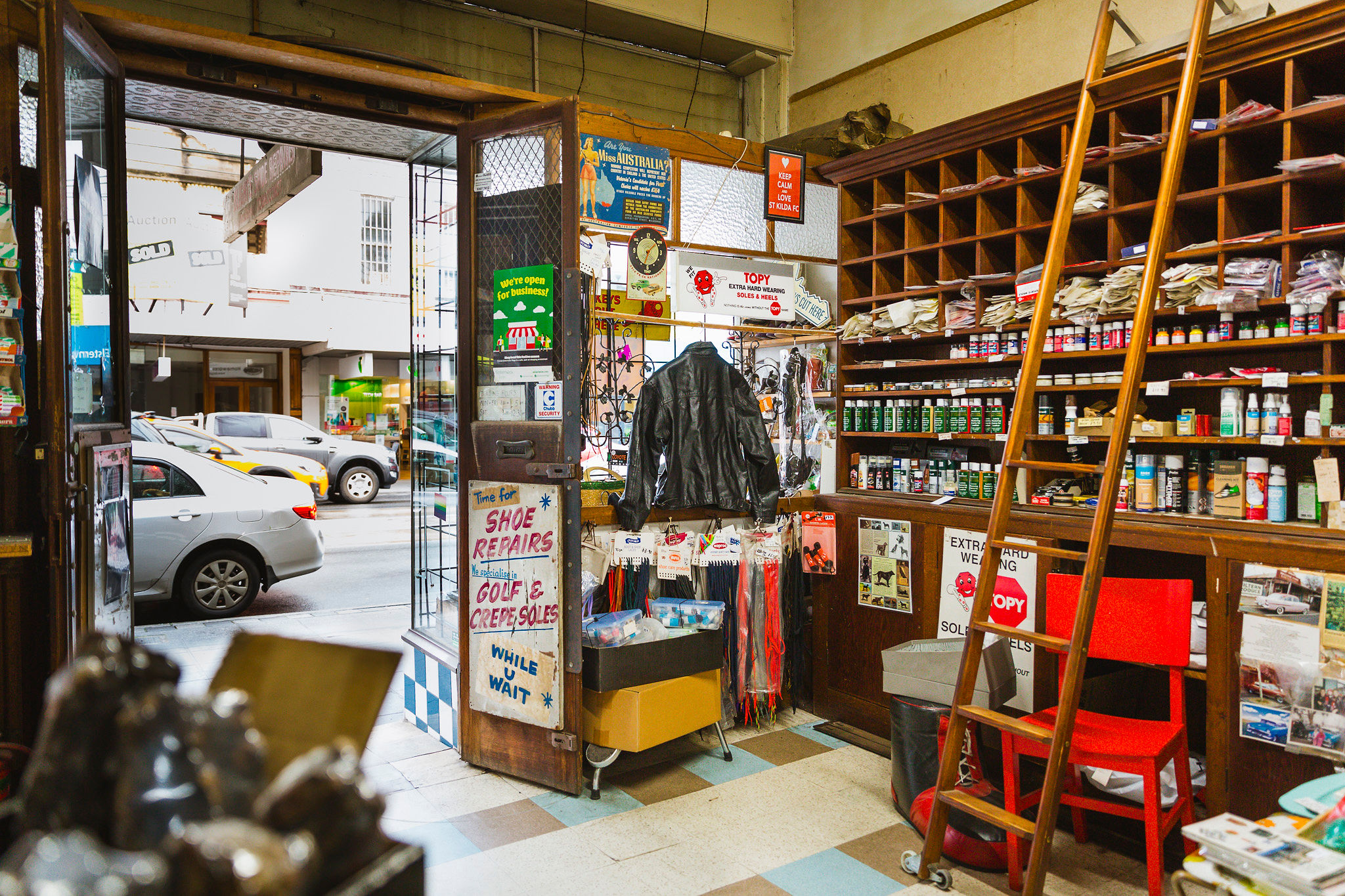
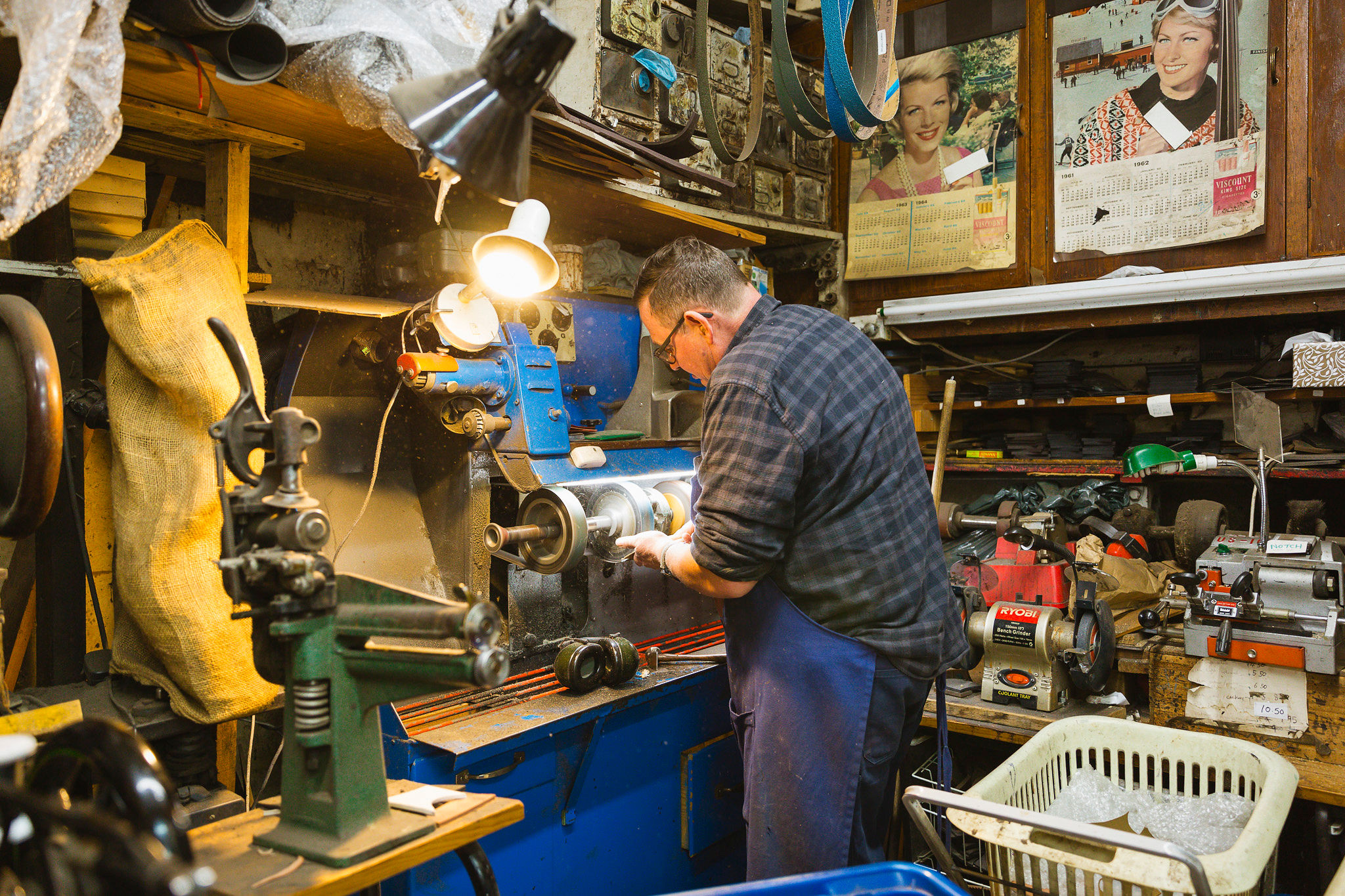
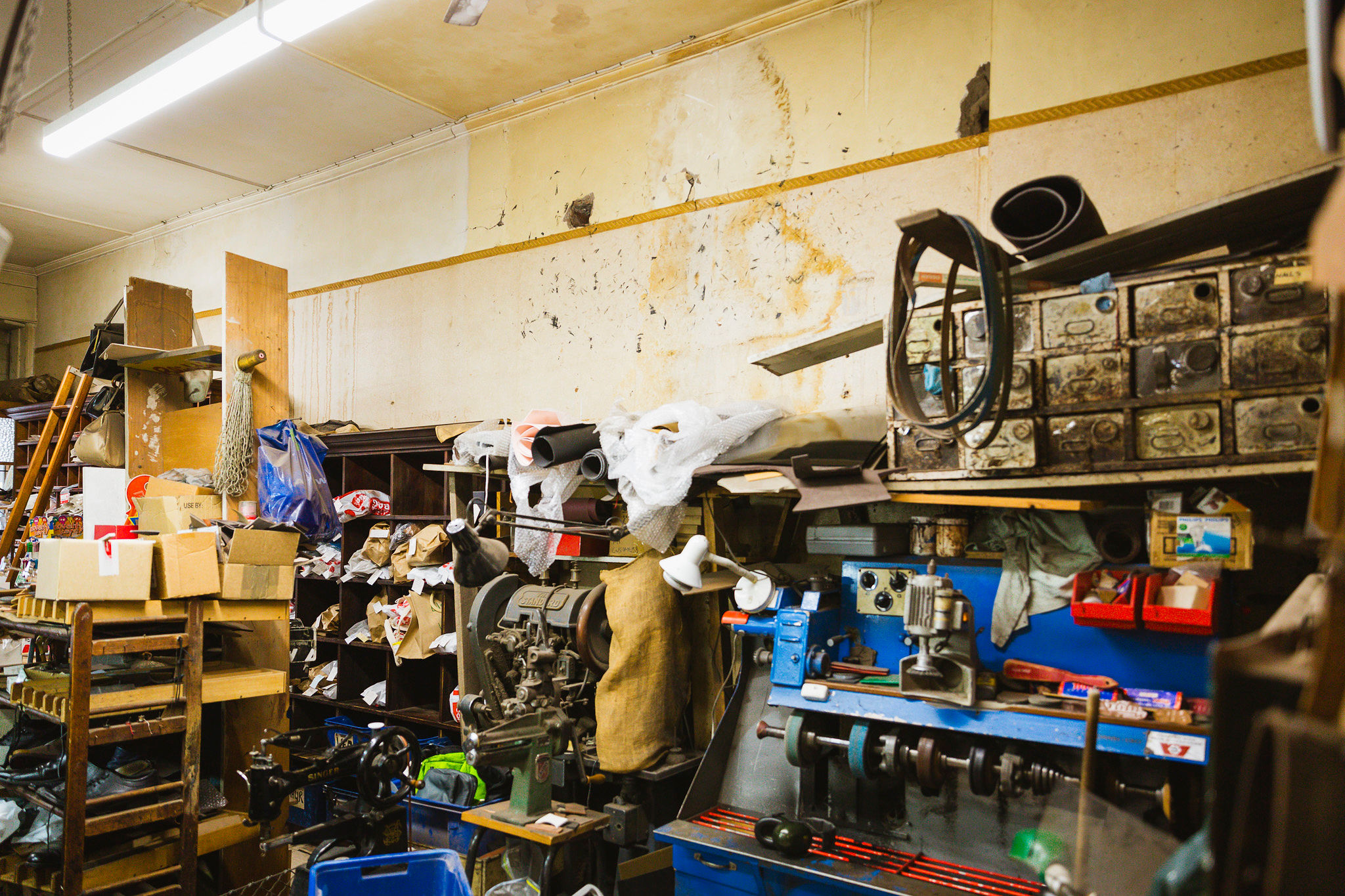
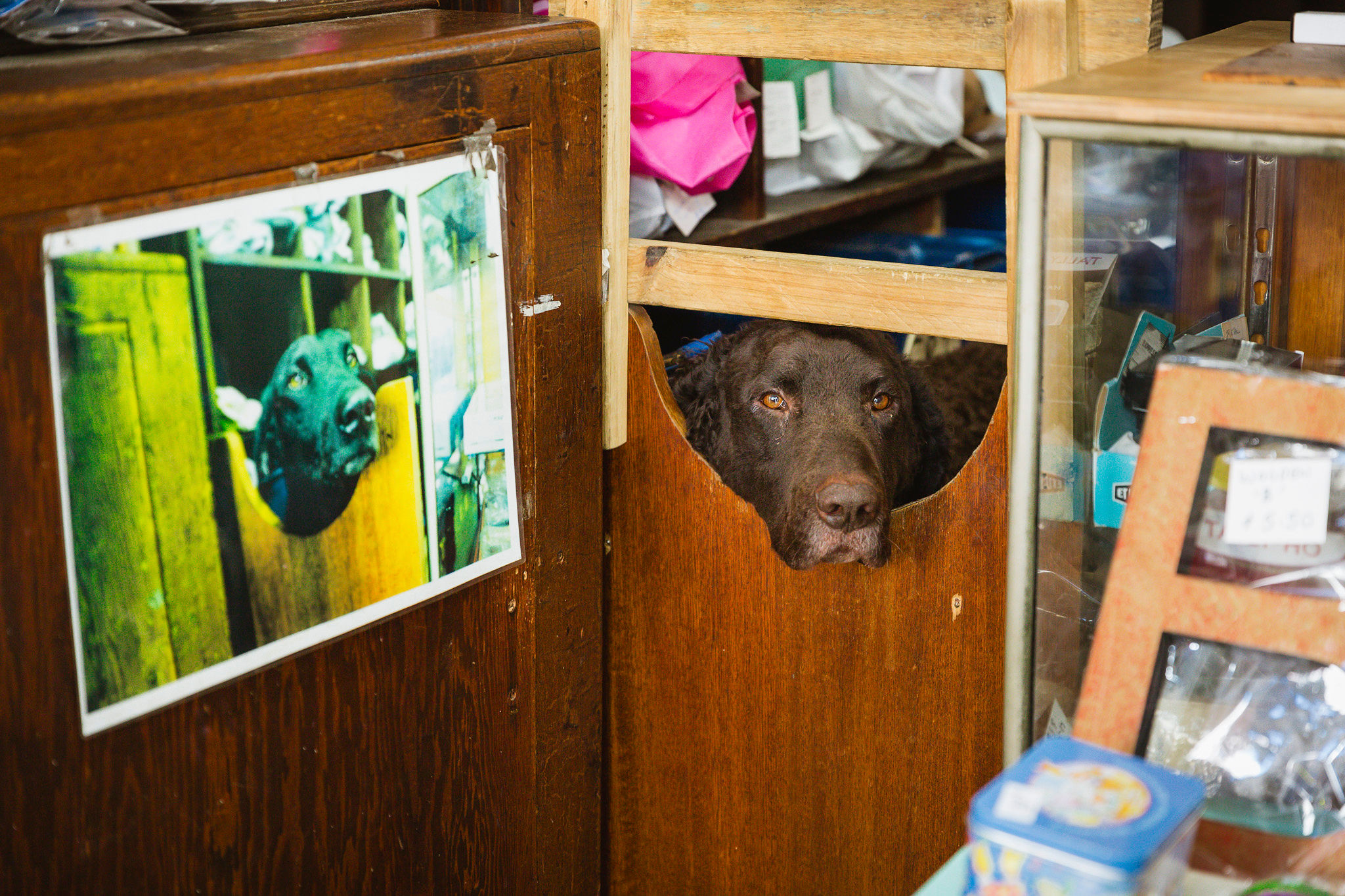
We’ve also sold all sorts of weird things over the years: radios, children’s typewriters, tin toys, shavers and shaving equipment, shoe care products, laces, shoehorns and – in the 1970s – we sold shoes. We get documentary makers and magicians who come in with props they want fixed up. They’ll also ask if we have an old lighter, or something from 1940s or 1950s that they can use. It’s a bit of a thrill seeing it on TV.
We’re really low tech, and don’t have a computer or much modern machinery in the shop. I still keep a manual ledger each day, and we had an EFTPOS machine installed just last year because of COVID, which took a bit of getting used to.
It's lovely that we can rely on each other and the tools that we've got to do a good day's work.
(Wes) Before Blight’s I wasn’t that interested in shoes, which I’ve now developed a love for.
But I’ve always been interested in the history of things.
When something is quite old, I imagine what the world was like at that time and feel a great sense of achievement at being able to fix it and make it serviceable. It’s lovely to give something new life and make it useful again. it gives you a bit of a buzz.
And it’s very hard to picture a repair straight away. You might think you’ll repair it one way, but the product tells you a different way that it's going to be repaired. With everything I do, I keep in mind that I don’t want it to look different. It’s got to look the same, but well cared for.
It’s satisfying when someone comes in and says, “I don’t know if you do this sort of thing, but you normally help me out.” So, they'll bring something really random. Usually I can fix it, or I'll know someone who can.
We have a lovely customer that comes in, and she always says to other customers, this is Wes, Mr. Fixit.
Now others are saying, “Oh, he’s Mr Fix It.”
We have grandparents who brought their children in, and now their children are coming in.
Some customers might have grown up in the area and moved away, but come back to get their repairs.
We also do a lot of orthopaedic jobs. Someone might have a short leg and need their heel built up. Or maybe they’ve had a knee replacement and need their shoe to be elevated on one part. There’s also customers who have hard-to-fit shoes – because their feet are small or large – so our service is really important to them.
It’s meaningful to watch customers grow up in the shop, and we've become a bit of a novelty factor. So many shops are modern and franchised and they've got a certain look about them, but people love our old-world charm, and the fact that it’s still going as it is.
It’s a real honour to have been able to keep it going for all these years.
Elsternwick was a more working class suburb when I was growing up, now it’s more affluent, gentrified and professional.
Many of our customers work in the city and need business shoes or high end fashion shoes. We put a TOPY sole in – a French sole which protects them – and provide a matching polish and laces to keep their shoes well-maintained and looking good.
Since the 1960s, the area has become more culturally diverse which has been fantastic. In particular, many young Orthodox Jews go to the synagogue on the Sabbath and Jewish holidays, and they need their black dress shoes repaired. It’s been fascinating learning about different traditions and celebrations, as well as the things that need to be repaired in order to get ready for their special holidays.
And over the last 10 years, there’s been a big push to reduce, reuse and recycle. Customers have had the same shoes for over 30 years, and we’ve re-soled them 10 times over that period. People want to keep repairing rather than buying cheap, throwaway, fast-fashion shoes that will end up in the landfill. People don’t want to be wasteful, and are mindful of the environment.
We are being given people’s things – which might be for work, weddings or to help their rehabilitation – and that is based on trust.
There’s that ongoing connection and community.
With our job, you are part counsellor and part advisor for other businesses.
We’re regularly recommending where to get a toasted sandwich on the street, helping people with directions and so on.
I’ve also known some customers my entire life. At Christmas time, we'll exchange presents, and we have people who come in to see the dogs. It’s your life when you work at the shop.
There’s a lot of people who live by themselves in Elsternwick, and they’ll come in each day to visit and say hello. It’s lovely for us to see and get to know them. I’ll go out the back to make a cup of tea and invite them to have a cuppa as well.
We get concerned when we don’t see people, so we’ll ring and make sure they’re okay. We also have customers that we normally see each week. They’ll ring and say, “Jane, what's happening? What are you cooking for dinner tonight?” Yesterday was our daughter’s 17th birthday, so some of the customers were dropping off presents or cards, and ringing to wish her well.
It’s lovely to think that different families were dropping off things for my parents to give to me, and now our customers are doing the same things for my daughters.
When I was growing up we had a shop cat, but when we started running the business our curly coated retriever Maggie was at home by herself for hours.
We’d be here late at night getting different jobs finished for the next day.
We started bringing her in to work, and had a special door made so she’d be safe behind the counter. That started a tradition of having our dogs behind the counter, which has lasted 25 years. Now, different families come in to see the dogs, or ring and say, “You're the shoe repair shop, the one with the dogs,” and we say “Yes, the one with the dogs.”
We now have two curly coated retrievers, Coco, who’s 12 and a half, and Keith, who’s six. Little kids, older customers and everyone who might not have pets will come in, pat the dogs and and spend time with them. At Christmas time they bring them Schmackos, or make them a blanket.
Some customers might be a bit difficult or grumpy, then they’ll see Keith or Coco and brighten up. They tell you about their dog, or discuss bringing their dog in to meet our dog. We’re so lucky to be able to bring them in with us.
They’re often the most enthusiastic workers to come in to work.
Last year, we were closed for about 20 weeks due to COVID-19 restrictions.
Normally we’d have two weeks’ annual leave for a little holiday, so the idea of closing our doors for so long was unimaginable. When I had my kids, the shop was closed for 3 weeks, and that was considered to be a huge break from the customer’s point of view.
I was happy to be home with Wes and the kids, and it was a bit of a glimpse of what retirement will be like. Our daughter was doing year 12, and our youngest was doing year 10, so it was lovely to have time with each other.
Our work phone diverts from the shop to home so people would ring every day to chat and ask when we were coming back. And after lockdown, customers were excited to be able to come back to the shops.
There was a sense of euphoria and excitement about being back and being able to do what we’ve done for 25 years. It also gave customers time to sort out the items that needed to be repaired. They were bringing their favourite shoes and bags, as well as rhubarb that they’d grown, or jam and chutney to welcome us back.
It also gave people a chance to slow down, catch their breath and think about what was important to them. There was a genuine sense of, “The shops have been closed, and we have to help to keep them going,” which was fantastic.
It was lovely that people missed us and wanted us back on deck.
If my grandfather was to return to the shop, he’d find much of it to be the exact same.
There might be certain aspects that are different – maybe more gluing and nailing rather than stitching of the soles – and people say we have the biggest range of shoe polishes and laces in Melbourne. But he’d be able to pick up the same hammer and pliers and use the same sewing machines that we still use today.
If we find an old tobacco tin, shoehorn, or something eclectic and interesting, we’ll put it in the window. That wouldn’t be foreign to him. It’s always been a variety store with different things under the one roof.
As we get older, the heritage and history of the shop becomes more pertinent. It’s a real honour to have been the head of an organisation that's been going for nearly 90 years. The shop has always been the same, and there’s that feeling of nostalgia, welcoming and warmth that customers have always experienced.
People who have been coming for 50 years come in and say, “Don’t change it, we love it.”
“We feel like it’s just like we walked through the doors when we were little.”
(Wes) If somebody had told me that I was going to be working here for 30 years, it would have seemed daunting.
But the time really flies.
Jane’s father used to say that things are a long time looking forward, but a short time looking back, which has certainly been the case.
What keeps me interested in the work is that you don’t know what repair you're going to get. And, as time goes on and your skills improve, you have the luxury of not worrying about how to do the job. You’re not second guessing yourself. When you know that you can do something well, you derive more enjoyment from it.
At the end of the day, it's fun but hard work. You have to enjoy talking to people and enjoy the sense of achievement that comes with fixing things up. Even though there's been a big push nowadays to recycle and repair, lots of things are made very cheaply. It can be hard to justify repairing them. You only repair something if you really love it, or you have troublesome or hard-to-find feet.
If we hadn't been third generations business owners, it would be easier to give up when things got hard.
But there’s that responsibility to keep the business going.
That's what really drives us at the end of the day.
We’ve been really lucky to work together, and be in and keep the same business going for so long.
It's fantastic when someone brings in their old shoes, bags or any sort of item in, and you're able to give them a makeover and fix them.
There’s always that level of job satisfaction, and that drive to do a good day’s work.
Our plan is to keep it going for as long as we can.
The years just tick by.
